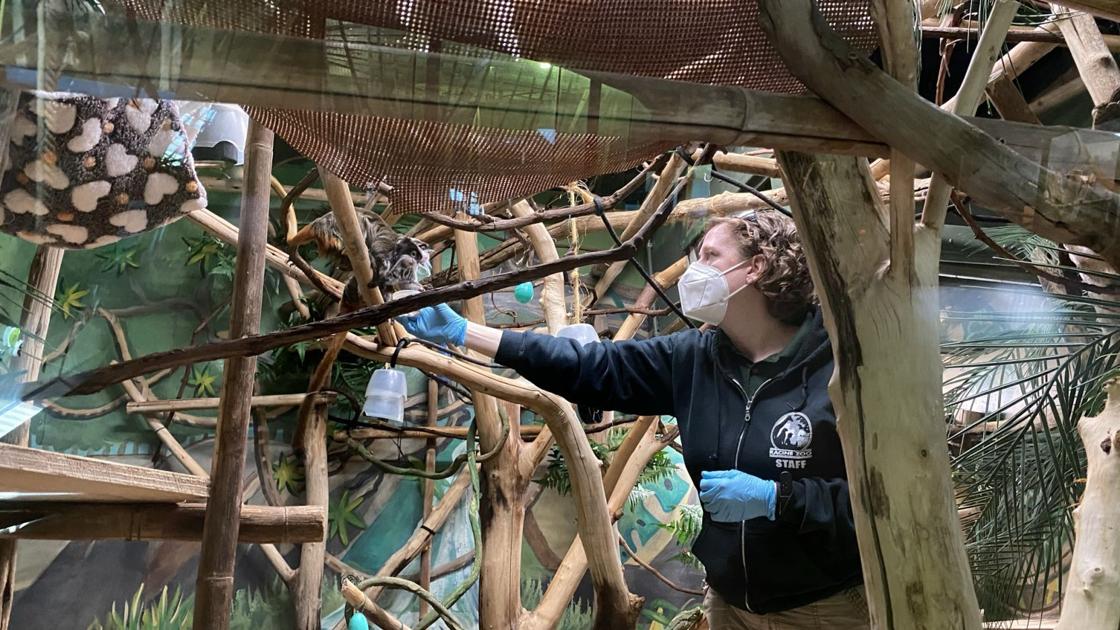
RACINE — Crystal Champeau has always loved primates, since she was a young child.
She’s also had a large interest in animals and knew she wanted to work with them.
“I loved Jane Goodall, I loved Dian Fossey growing up. I wanted to live in the rain forest and study primates,” she said.
While Champeau didn’t end up living in the rain forest, and instead resides in Mount Pleasant, she’s been living out the other half of her dream.

Champeau
She’s the Racine Zoo primate expert and works with primates, conducting standout work with orangutans and tamarins. She’s presented her findings around the country.
Champeau has been with the zoo since 2006, longer than Executive Director Beth Heidorn, who’s been with the zoo for six years.

Heidorn
“She’s a blessing to have here,” Heidorn said of Champeau.
Initially, Champeau worked with both primates and large carnivores, as her prior experience was with both types of animals. She eventually transitioned to focusing just on primates.
Monkeys team up to save a friend from a massive snake.
Champeau is the primary primate care specialist and enrichment coordinator with the zoo. An enrichment coordinator facilitates mentally or physically stimulating activities for the animals, prompting them to be active doing things they would normally be doing in the wild.
She also works with the veterinarian staff and has learned how to do blood draws and ultrasounds, procedures she’s focused on in recent years.
Developing an interest
Despite her animal interest from a young age, Champeau describes her entry into zoology as “stumbling” into it after taking advantage of an internship while in college.
“It actually turned out to be a great fit,” she said. “I get to do a lot of the behavioral stuff that I really enjoy, whether it’s observations or training. I get a lot of the science side of things, too … I kind of get my science, nerdy side filled and I get to be active and work with animals, which I’ve always loved.”
Champeau studied biology at Northland College in Ashland because she originally wanted to do field research in biology, chemistry or mathematics.
The internship happened to be with primates, which she said was lucky.
“That’s not always an easy thing to sneak into,” she said.
During her first job, at the Topeka Zoo in Kansas, she said she was trained in the ape building and “found a spot in there. A lot of stars aligned.”
Coming to Racine
She said she really loved gorillas at that first job, then loved orangutans and partially came to Racine from Topeka because there were orangutans here.
“And then I got here and fell in love with more primate species,” Champeau said. “Once you work with something, they kind of steal your heart.”
Another part was to be closer to home — she is originally from Sheboygan and most of her family still resides there.
Now, she works with emperor tamarins, which she said hold a “special place” in her heart.
Champeau said she’s been drawn to smaller zoos and appreciates the Racine Zoo because zoo staff can get to know the other keepers, are given leeway to pursue passions and are allowed to help in different capacities.
One of these passions, for Champeau, was developing ways to monitor a tamarin’s pregnancy. Ultrasounds are done with many species of animals, but as far as Champeau knew, no one had been doing them for tamarins.

Crystal Champeau performs an ultrasound on a pregnant emperor tamarin while giving her some formula.
When the zoo started breeding tamarins in 2014, Champeau started with a fetal heart rate monitor and thought she heard a heartbeat in the womb of what she thought was a pregnant tamarin.
“It kind of just came from that. I’m a huge planner. I like to be able to make plans and I wanted to know if she was pregnant, when she was having this baby and everything we could know,” Champeau said.
Initially, she just confirmed pregnancies, she said. Now her work has evolved into collecting measurements, predicting due dates and communicating information to other zoos so they can do the same.
Sharing the work
Champeau has spoken at workshops in the U.S., drawing keepers nationally and internationally, and people who work in conservation.
The workshops have been in Racine, but also as far away as Colorado, Kansas and Massachusetts.
“Zoos in general cooperate with each other on a large scale,” Heidorn said. “If we learn something, we will share it. We don’t hold our information, nor does anybody else, because it is all for the good of the animals.”
In 2016, Champeau gave a presentation focusing on a male orangutan at the Racine Zoo. The presentation was part of the husbandry workshop organized by the Orangutan Species Survival Plan. An arm of the Association of Zoos and Aquariums, the Orangutan SSP works with more than 50 accredited zoos across the U.S., Canada and Mexico.
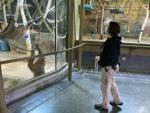
Crystal Champeau looks in on an orangutan Wednesday in the Vanishing Kingdom building at the Racine Zoo, 2131 N. Main St.
Rob Vernon, senior vice president of communications and strategy for AZA, said in a statement that people who work at AZA-accredited zoos and aquariums are driven by high skill levels, a “thirst” to provide better care for the animals and an openness to share experiences.
“Networking and challenging one another through conferences, husbandry workshops like those of the Orangutan SSP, and other communications is a laudatory characteristic of the AZA community,” Vernon said in the statement.
“It was nice to be recognized from that international side,” Heidorn said. “She (Champeau) is one of the best in the entire country and our animals are better for it.”
The presentation was about how Champeau trained the male orangutan to allow the examination of his blood glucose. Keepers prick a finger or toe, then test a drop of blood with a glucose device, the same device that would be used on a human. It took a lot of work before she could make a presentation about it, she said.
“It sounds simple, but it wasn’t, necessarily,” Champeau said. “The training aspect is super easy because he is really easy to train. He actually enjoys a lot of keeper time. But their skin is much thicker than ours, so it took a lot of trial and error to figure out how to do that exactly, and there weren’t any other zoos currently doing it.”
She’s also given a presentation in 2019 about her hand rearing experience with emperor tamarins. Hand-rearing is when a human feeds and cares for a young animal until it is grown.
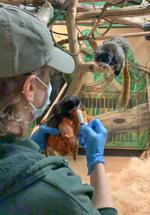
Crystal Champeau feeds an emperor tamarin baby some formula in 2019. The tamarin's mother had died five days after delivering the baby and the Racine Zoo was the first zoo to provide a particular method of hand-rearing the baby tamarin.
In January 2019, a mother tamarin at the Racine Zoo died after delivering a baby just five days before.
Champeau and zoo staff stepped in to provide care for the infant, and they were the first zoo staff to develop a particular method of hand-rearing a baby tamarin, she said. Inspiration came from the Brookfield Zoo in Brookfield, Illinois, where staff had developed a hand-rearing technique for a similar species.
Keepers were syringe-feeding the emperor tamarin infant, then eventually brought her back to her family. The baby was able to live with her sister when her sister had babies.
“Not quite, but we almost got full circle of seeing her take care of some babies herself, and exhibiting some normal, natural tamarin behaviors that we’ve seen all of our parent-reared kids do,” Champeau said.
World-renowned work
Champeau has traveled around the country and around the world, working on conservation, education, enrichment and observation.
Champeau traveled to Southeast Asia annually from 2012 to 2014 to learn more about wild orangutan behavior and conservation efforts and to help troubleshoot scenarios where orangutans can’t be released back into the wild.
“Not only does she take care of our animals here, but also she’s on that global scale. That’s a testament to her commitment and passion for primates on all sides,” Heidorn said.
She’s also attended workshops with New World Primate Taxon Advisory Group, which oversees all South American primates. South American primates at the Racine Zoo include black-handed spider monkeys and emperor tamarins.
Champeau is part of the TAG steering committee, which works to manage primate populations of zoos to maintain genetic diversity. The TAG also offers help with husbandry guidelines, what exhibits should look like, conservation and education efforts and enrichment.
Current and future work
Champeau wants to continue working with primates, which has been her favorite animal group. She’s continued her ultrasound work, gathering measurements and working with orangutans.
She’s also continuing the “voluntary” blood draws in a lot of the primates. The voluntary part takes training — the animal is trained to present the body part to the keeper to allow these tests to be done.
“We don’t want to anesthetize our animals every single time we want to check out any little scrape or get some blood or whatever,” Champeau said.
“Crystal does it better than anybody,” Heidorn said, speaking of Champeau’s husbandry care for animals. “It’s amazing work that she is doing, and it doesn’t just go from A to B in a day. The animals trust her to do what’s right for them.”
Champeau said in the future, she’d like to do more voluntary blood pressure measurements and voluntary cardiac ultra sounds.
She would also love to continue doing conservation work in Southeast Asia and South America.
“It gave me a different perspective, coming back and actually seeing some of those conservation issues first-hand. Then I was able to talk to guests about that, having that knowledge,” Champeau said. “It just makes it a little bit different to be able to explain to people, to really get them excited about conservation and why we should save these animals.”
IN PHOTOS: Racine Zoo's Eggstravaganza sees egg-cellent return
Watch: Beth Heidorn, Racine Zoo
Waiting for a photo

Families wait in line for a photo opportunity with the Easter Bunny at the Racine Zoo Eggstravaganza on Saturday. The Easter-themed event went from 10 a.m. to 4 p.m. and featured a “cluck-cluck door” hunt throughout the zoo to collect candy, a trunk hunt (Easter style trunk-or-treat), cookie decorating to-go, egg decorating to-go, crafts to-go and photos with the Easter bunny. Visit JournalTimes.com/gallery for more photos from Saturday's zoo event.
Getting a photo

Kristen Humphrey takes a photo of a little girl with the Easter Bunny during the Racine Zoo Eggstravaganza on Saturday.
Many booths

A representative from Landmark Credit Union hands candy to a girl during the Racine Zoo Eggstravaganza on Saturday. Many businesses were in attendance to hand out goodies at the event.
A nice turnout

Families enjoy the day at the Racine Zoo Eggstravaganza. Beth Heidorn, executive director of the zoo, said visitors have done a good job social distancing, and there has been a steady flow of people coming and going to make sure the zoo isn't too full.
In the Easter spirit

A family walks through the Racine Zoo during its Eggstravaganza event on Saturday. Many attendees sported festive attire.
The train is back

The famous train at Racine Zoo is seen back in commission at the Eggstravaganza event on Saturday.
April 11, 2021 at 06:00PM
https://ift.tt/2RpT7wq
'A blessing to have here:' Racine Zoo's Crystal Champeau transcends work for primates nationally, internationally - Lake Geneva Regional News
https://ift.tt/2VuKK1x
Work
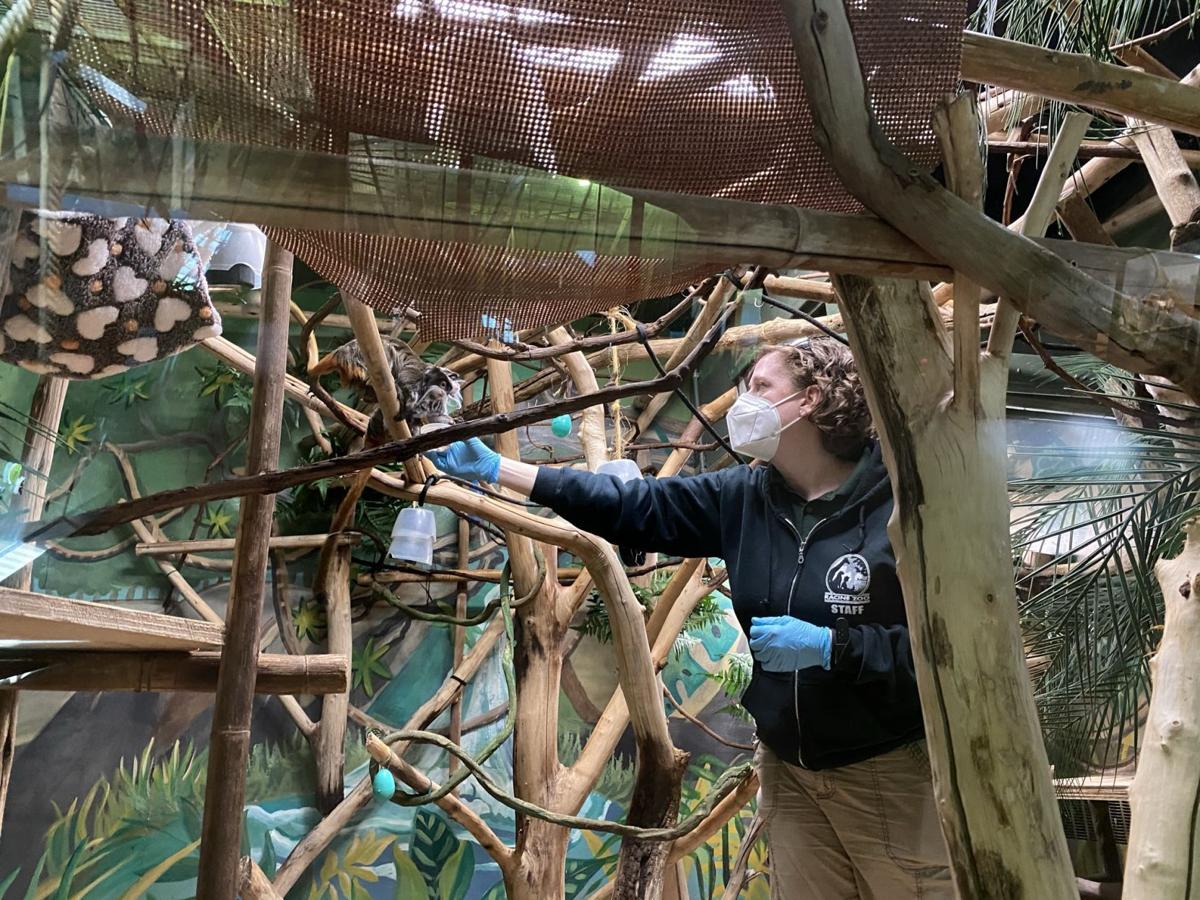
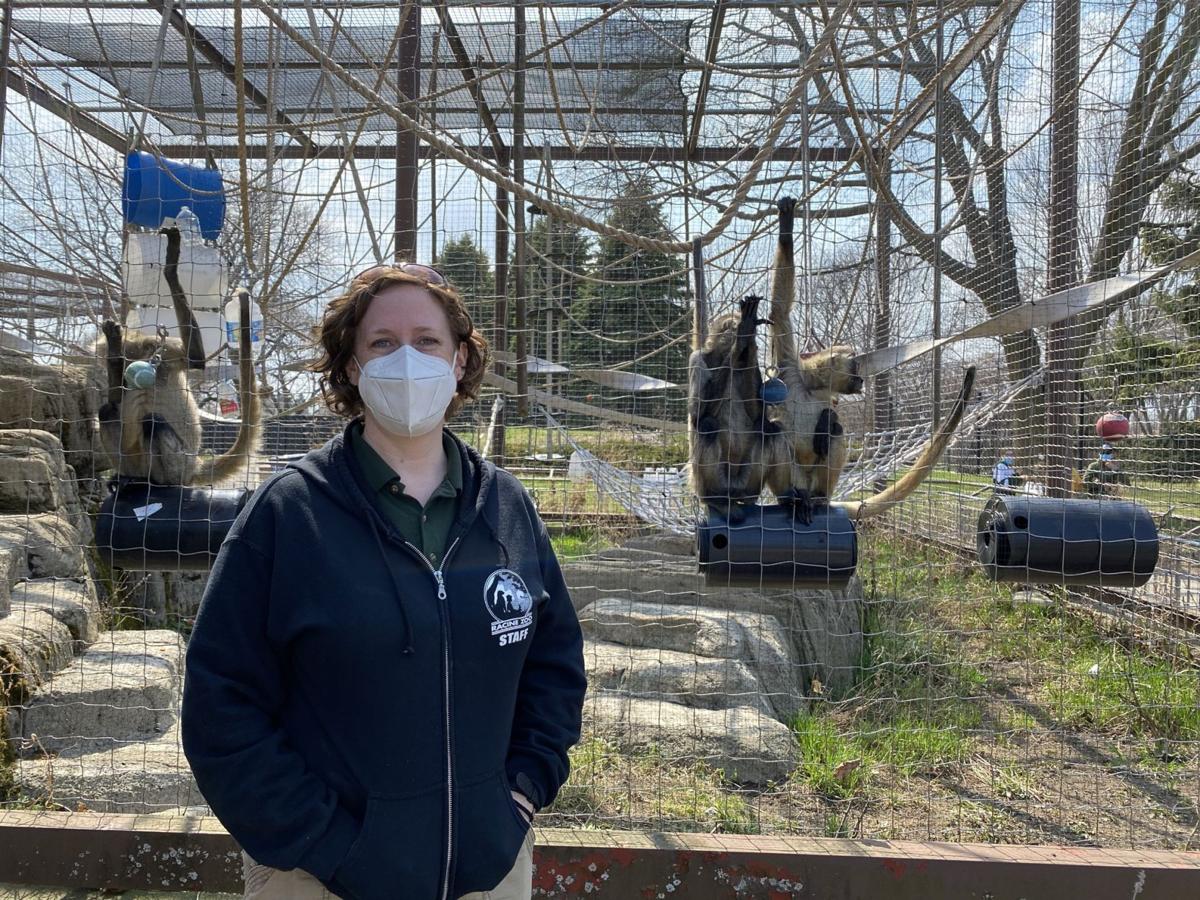

No comments:
Post a Comment